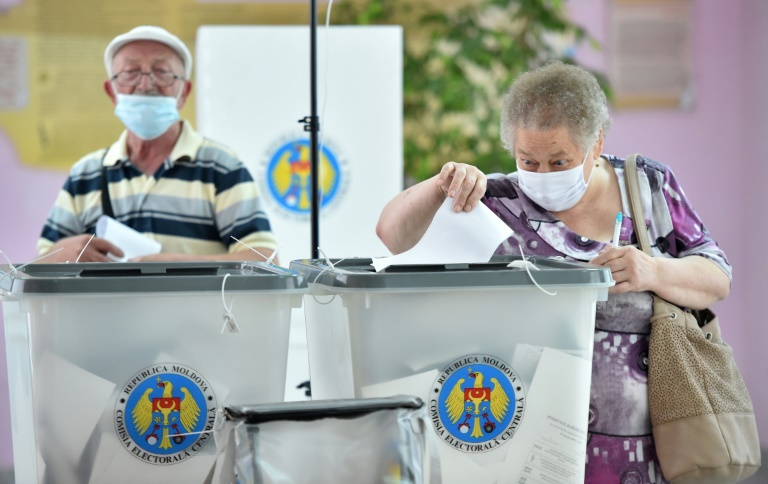Vote counting was underway in Moldova Sunday after snap parliamentary elections called by President Maia Sandu to shore up her position against pro-Russia forces.
Polls closed at 9:00 pm (1800 GMT) and the first official results were expected later Sunday.
Casting her ballot in the capital Chisinau, Sandu said she had voted for change in the small ex-Soviet country beset by poverty and corruption.
“I voted for an honest parliament to work with, for a parliament that will appoint honest people, competent people,” Sandu told journalists after voting.
Her predecessor Igor Dodon, a Kremlin-backed politician she defeated last year, warned against voting for those who will “hand over the country to external control” as he cast his ballot.
Wedged between Ukraine and EU member Romania, the country of about 2.6 million has long been divided over closer ties with the European Union or maintaining Soviet-era relations with Moscow.
With lawmakers loyal to Dodon blocking Sandu’s promises of reform after her election win in November, she dissolved parliament in April and scheduled the snap vote.
The 49-year-old former World Bank economist’s promises of honesty and competence will resonate with many Moldovans, who in recent years have seen their nation rocked by political crises and corruption scandals.
“Maybe we will have a parliament that will think about our Moldova.
For the sake of our children, for a beautiful future,” Ana Olari, a 40-year-old confectioner, told AFP.
More than 48 percent of eligible voters cast their ballots in the election. That represented a higher turnout than the first round of the presidential vote but lower than in the second round-run off at 53 percent.
– ‘Symbol of change’ –
Sandu, who also served briefly as prime minister, has for many Moldovans become “a symbol of change”, said Alexei Tulbure, a political analyst and the country’s ex-ambassador to the United Nations.
At polling stations, voters had to wear masks and have their temperature taken in a bid to prevent the spread of the coronavirus.
Twenty parties and two electoral blocs are running in the election.
They must cross thresholds set at five percent and seven percent of the votes respectively to obtain seats in the unicameral assembly, where 101 lawmakers are elected for four-year terms.
Sandu’s PAS appeared to be leading ahead of the vote, with the latest polls giving it a 35-37 percent share.
Its main rivals from the coalition of socialists and Communists led by Dodon and former president Vladimir Voronin were polling at 21-27 percent.
Analysts say the diaspora — which accounts for more than a third of Moldova’s eligible voters and widely backed Sandu during the presidential vote — could hold the key and bring the PAS another 10-15 percentage points this time round.
Long queues formed outside the polling stations abroad and some voters — particularly in Germany and France — reserved a seat from Saturday evening, media in Moldova reported.
The diaspora cast more than 200,000 votes abroad compared to the record figure of 262,000 in the second round of the presidential election.
– Irritating the Kremlin –
Observers say a win for Sandu’s party will likely be a blow to Russia, which wants Moldova to remain in its sphere of influence.
But “even with a parliamentary majority, it will not be easy to carry out her grandiose plans for in-depth change,” independent analyst Victor Ciobanu said.
“There will be severe opposition” from the pro-Russian side, he added.
Sandu has already irritated the Kremlin by proposing to remove the Russian military garrison based in Transnistria, a pro-Russian breakaway state straddling the country’s eastern frontier with Ukraine.
An AFP correspondent saw dozens of people standing in queues at special polling stations in eastern Moldova set up for residents of the separatist region.
Moldovan police said that they had reported 242 “possible electoral violations”.
Dodon, 46, told journalists Sunday evening that he would “decide whether to protest the election results” after all the violations were analysed.
In Chisinau, Lyudmila, a 70-year-old pensioner, said she supported the Communists and socialists because “life was better” under their rule.











